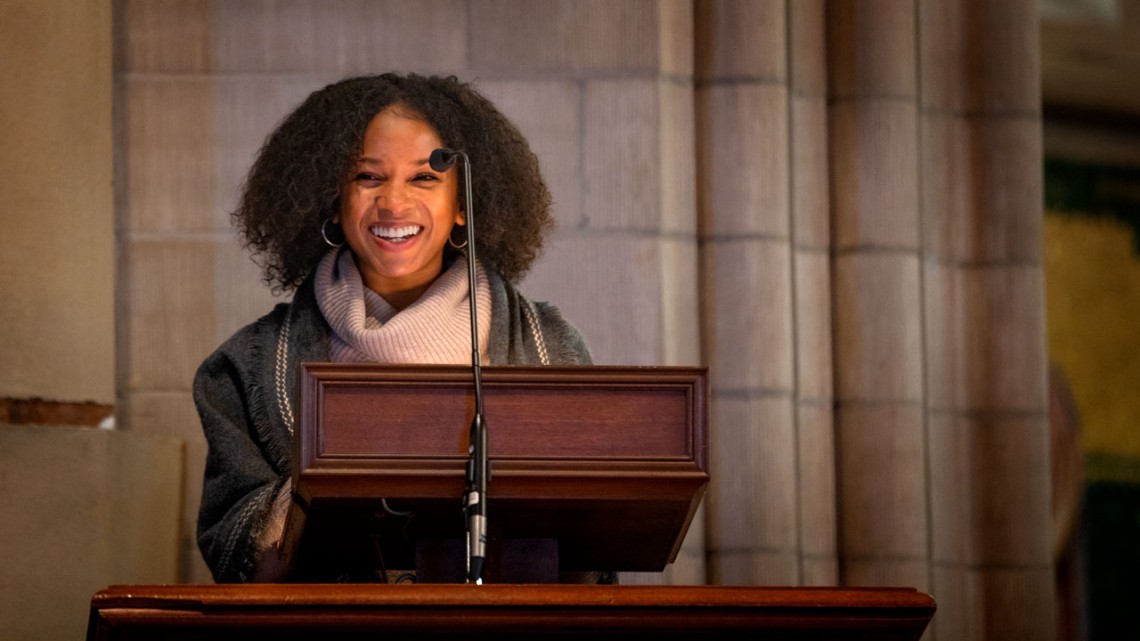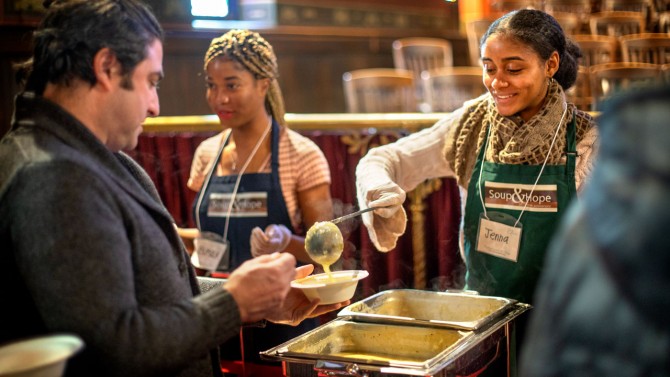
Imani Majied delivers the Soup & Hope talk on Feb. 28 in Sage Chapel.
Imani Majied ’19 recounts her journey toward service
By Nancy Doolittle
Imani Majied ’19 has spent her life with labels, both negative and positive. But a haunting question posed by a friend of her mother’s, as well as her community engagement work through Cornell, have taught Majied how to move past the labels and focus on service to others and a purpose outside herself.
At Soup & Hope Feb. 28, Majied described her first understanding of labels when, at the age of 5, she learned from her suburban neighbors that – because she was black and Muslim and came from a family of modest means – others could perceive her negatively. Her well-educated parents taught her that, in spite of these labels, no one could take Majied’s background from her: They knew that education could give Majied access to a better life.
“I grew up with books and religion,” Majied told the Sage Chapel audience, which included her father, who had driven from New Jersey to hear her talk.
Majied said she thought she had moved past the negative labels when she reached high school age and a nonprofit organization made it possible for her to go to an elite boarding school.
“I felt like I was living a dream,” she said. “I was involved in organizations on campus, had access to internships, was making friends and connections. All this made me feel like I was doing something.”
But walking in Harlem one day, Majied ran into one of her mother’s friends, who asked her, “What are you doing?” Majied said she was on her way to the library.
The woman interrupted her: “No, I mean, what are you doing?” Majied told her about boarding school, and again the woman asked the same question, this time answering it herself: “You are a child of God and, therefore, you are here to serve.”
Four years later, during her first year at Cornell, Majied reconsidered that question. She became an engagement ambassador for Engaged Cornell – but, she admitted, she was more attracted by the opportunity to travel abroad than the desire to teach children English.
Shortly after arriving at a children’s camp in Spain, Majied realized the program’s administrators did not care about the students or the teachers. All they wanted was the money that came with conducting the program.
She left that camp and lived in Valencia, but had little money, no work papers and eight weeks before she could return home. “I felt completely stuck,” she said.
But in that eight weeks, she made friends and had experiences she never could have planned for.
For her next community engagement project, Majied was determined that her answer to the question “What are you doing?” would not be “serving myself.” She went to the Islamic Leadership School in the Bronx, New York, to teach immigrant Muslim children. She soon learned that the curriculum she had prepared was useless in that environment and that she would need to engage stakeholders in the community if her teaching was to have a long-term effect.
Those two engagement experiences taught Majied that she did not need money, labels or credentials to prove her worth. She just needed to be truly involved.
The summer after her sophomore year, Majied and Muhammad Ansari, a graduate of Howard University, decided to tackle the problem of food waste for some and food insecurity for others. With support from the Office of Engagement Initiatives, Entrepreneurship at Cornell, the Office of Academic and Diversity Initiatives and the Dyson School, they have set up the social enterprise, “Everybody Eats.” This enterprise, which will launch in spring 2019, is a food delivery service where a portion of the proceeds from every meal ordered helps cover the cost of a meal for someone in the local community who is struggling to eat.
With this enterprise, Majied feels she finally can answer the question, “What are you doing?” by fulfilling her responsibility to serve, being present in the experience and surrendering to whatever it is that life presents. Says Majied: “I am free and focused and happy.”
Media Contact
Get Cornell news delivered right to your inbox.
Subscribe

